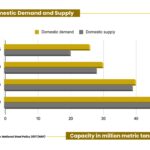
The recycled metal industry is an integral part of the global economy, enabling sustainable manufacturing and reducing environmental footprints. However, the prices of recycled metals are anything but stable. For traders like us at JD Metals, understanding how global markets impact recycled metal prices is crucial for staying competitive and ensuring profitable transactions.
In this blog, we explore the key factors that influence recycled metal prices and share insights from a trader’s perspective.
The fundamental principle of supply and demand plays a significant role in determining recycled metal prices. When global industries—such as construction, automotive, or electronics—experience growth, the demand for metals like aluminum, copper, and steel rises. This increased demand drives up the prices of recycled metals, as they become a cost-effective alternative to virgin materials.
Conversely, economic slowdowns or reduced industrial activity can lead to a decrease in demand, causing prices to drop. For example, during the COVID-19 pandemic, reduced construction and manufacturing activities led to a temporary slump in recycled metal prices worldwide.
Trade policies and tariffs imposed by major economies have a direct impact on global metal markets. Restrictions on scrap metal exports, for instance, can limit the global supply, driving up prices in certain regions. Similarly, tariffs on metal imports can make recycled metals more competitive compared to virgin metals.
A notable example is China’s ban on certain scrap metal imports in recent years, which reshaped global trade flows. Traders had to identify new markets for their materials, leading to regional price fluctuations.
Since recycled metals are traded globally, exchange rates play a crucial role in price determination. A strong U.S. dollar, for instance, can make metals priced in dollars more expensive for buyers using other currencies, potentially lowering demand. Conversely, a weaker dollar can make these metals more affordable internationally, boosting demand and prices.
The prices of virgin metals heavily influence the value of their recycled counterparts. When the cost of mining and refining raw materials increases, manufacturers often turn to recycled metals as a cost-saving alternative. This shift in demand pushes up the prices of recycled metals.
On the other hand, when raw material prices drop, recycled metals may lose their competitive edge, leading to lower prices.
Energy is a significant cost factor in both recycling and transportation. High energy prices can increase the cost of processing recycled metals, which gets passed down the supply chain. Similarly, rising fuel costs can make transportation more expensive, particularly for global shipments, affecting the final price of recycled metals.
Geopolitical tensions, trade wars, and natural disasters can disrupt the supply chain and create uncertainty in global markets. For instance, conflicts in resource-rich regions can limit the supply of scrap metals, driving up prices. Similarly, hurricanes, floods, or earthquakes can impact recycling facilities or transportation routes, leading to temporary price spikes.
Advances in recycling technologies and processes can also impact prices. For example, innovations that improve the efficiency of metal recovery can increase the supply of high-quality recycled metals, potentially stabilizing or reducing prices. Conversely, a lack of investment in recycling infrastructure in certain regions can limit supply and drive up costs.
For traders, staying ahead in the recycled metal market requires constant monitoring of global trends and a deep understanding of these factors. At JD Metals, we leverage a combination of market analysis, long-term partnerships, and flexible strategies to navigate price volatility and ensure fair, transparent transactions.
Our approach includes:
The recycled metal market is a dynamic, ever-changing landscape influenced by a myriad of global factors. By understanding how these elements interact, traders can make informed decisions and seize opportunities even in volatile conditions.
At JD Metals, we pride ourselves on being your trusted partner in navigating these complexities. Whether you’re a supplier or a buyer, our expertise and commitment to sustainability ensure mutually beneficial outcomes. Connect with us to learn more about how we can meet your recycled metal trading needs.

2025-07-21T06:20:27

2025-05-16T08:22:06

2025-04-30T18:46:27

2025-04-19T06:27:16

2025-04-16T16:52:55